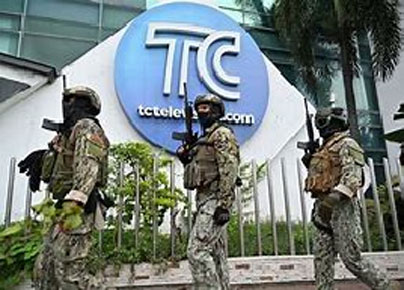Security Crisis in Ecuador
2024-01-12

Ecuador ended 2023 with a record-breaking crime rate, marking the highest level of violence in the nation’s history. Official figures reported a total of 7,878 crimes committed up to December 31, 2023, translating to a rate of 46.5 violent murders per hundred thousand inhabitants. The alarming crime rate was compounded by a high level of impunity, indicative of narco politics and a compromised judicial system. On January 8th, 2024, Ecuador woke up with confirmed news that Adolfo Macías Villamar, alias Fito, head of the criminal gang Los Choneros, was missing from the Guayas Social Rehabilitation Center No. 4, also known as the Regional Jail, considered a maximum-security prison. Notably, by dawn of the same day, there was also a prison break in Riobamba, with several prisoners, including Fabricio Colón Pico, one of the leaders of Los Lobos the antagonistic gang, and suspect in a plot against prosecutor Diana Salazar, escaping custody. In response to the escalating prison crisis, the government of Daniel Noboa ordered a swift intervention to take control of security in the prison system and announced at mid-afternoon the delivery of a second set of questions for a constitutional referendum. These questions would be a declaration of war against the drug mafia by including questions on these topics:
Extradition of criminals for transnational crimes
Domain extinction to combat crime and organized crime
Immediate revocation of illegal mining concessions
That the Executive’s urgent projects are not only on economic issues, but also on security and other issues of national interest
Pardons for military and police while using force in their line of duty
Regulation of constitutional justice, i.e., resources such as protection actions or habeas corpus
Specialized judges for the trial of police and military
By the evening, the government declared its first state of exception in the country, which allows the mobilization of our national army and includes a curfew between 23:00 and 05:00. The country is currently in a state of exception for 60 days. Several violent events have been reported right after the signing of the executive decree. The state of emergency has been met with a wave of violent incidents, including attacks with explosives, vehicle fires, and police kidnappings in various provinces. Esmeraldas, Pichincha, Azuay, El Oro, Los Ríos, Loja, Chimborazo, and Guayas have all reported such incidents. On January 9th, President Noboa signed another executive decree declaring Internal Armed Conflict and identified some transnational organized crime groups as terrorist organizations and belligerent non-state actors. Military and police operations took place around Ecuador on January 11 in response to a wave of violence and the detention of nearly 180 prison staff by inmates, with the government pledging to wage war on crime gangs they blame for the unrest.
The dramatic spike in violence this week - including the on-air storming of a TV station, unexplained explosions in a variety of cities, and the kidnapping of police officers - appears to be a response to plans by new President Daniel Noboa to tackle a dire security situation. The 36-year-old President is being supported by the often-fractious national assembly, which voted unanimously late on January 10 to back his security efforts so far. Banana export operations were affected after the closure of the ports in Guayaquil and Puerto Bolivar on Tuesday 9th of January and Wednesday 10th. Some carton manufacturers didn’t deliver the cardboard boxes necessary to pack the fruit and several workers didn’t attend to their jobs in banana farms or elsewhere. There were accidents on occasions with attacks to trucks transporting bananas and other material. After an exchange of bullets with police agents, a group of criminals set fire to a truck with boxes of bananas, this occurred around 11:00 p.m. in the Esperanza de Oro precinct, near the canton of El Guabo. It was reported that armed subjects intercepted a truck with banana boxes, it is presumed that the suspects were injured when hit by projectiles but managed to escape.
Police reported that a large amount of explosive material was found at the scene. Faced with this risk, they opted to close the Pan-American highway in the El Guabo – Ponce Enríquez section.
Activities were back to normal on Thursday 11th January and Friday 12, but exports might decrease considering that depending on the cut-off for taking the containers with the fruit to the ports some exporters might have missed the day or time due to the unrest.









